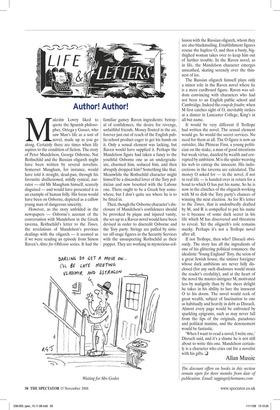Author! Author!
Malcolm Lowry liked to quote the Spanish philosopher, Ortega y Gasset, who saw Man’s life as a sort of novel, made up as you go along. Certainly there are times when life aspires to the condition of fiction. The story of Peter Mandelson, George Osborne, Nat Rothschild and the Russian oligarch might have been written by several novelists. Somerset Maugham, for instance, would have told it straight, dead-pan, through his favourite disillusioned, mildly cynical, narrator — old Mr Maugham himself, scarcely disguised — and would have presented it as an example of human folly. His focus would have been on Osborne, depicted as a callow young man of dangerous sincerity.
However, as the story unfolded in the newspapers — Osborne’s account of the conversation with Mandelson in the Greek taverna, Rothschild’s letter to the Times, the revelations of Mandelson’s previous dealings with the oligarch — it seemed as if we were reading an episode from Simon Raven’s Alms for Oblivion series. It had the familiar gamey Raven ingredients: betrayal of confidences, the desire for revenge, unfaithful friends. Money floated in the air, forever just out of reach of the English public-school product eager to get his hands on it. Only a sexual element was lacking, but Raven would have supplied it. Perhaps the Mandelson figure had taken a fancy to the youthful Osborne one as an undergraduate, charmed him, seduced him, and then abruptly dropped him? Something like that. Meanwhile the Rothschild character might himself be a discarded lover of the Tory politician and now besotted with the Labour one. There ought to be a Greek boy somewhere, but I don’t quite see where he is to be fitted in.
Then, though the Osborne character’s disclosure of Mandelson’s confidences should be provoked by pique and injured vanity, the set-up in a Raven novel would have been devised in order to discredit Osborne and the Tory party. Strings are pulled by sinister off-stage figures in the Security Services with the unsuspecting Rothschild as their puppet. They are working in mysterious col lusion with the Russian oligarch, whom they are also blackmailing. Establishment figures rescue the hapless O, and then a busty, bigthighed woman takes over to keep him out of further trouble. In the Raven novel, as in life, the Mandelson character emerges unscathed, skating serenely over the thinnest of ice.
The Russian oligarch himself plays only a minor role in the Raven novel where he is a mere cardboard figure. Raven was seldom convincing with characters who had not been to an English public school and Cambridge. Indeed the coup de foudre, when M first catches sight of O, inevitably strikes at a dinner in Lancaster College, King’s in all but name.
It would be very different if Trollope had written the novel. The sexual element would go. So would the secret services. No need for them at all. The O figure is now an outsider, like Phineas Finn, a young politician on the make, a man of good intentions but weak virtue, dazzled by wealth and corrupted by ambition. M is the spider weaving his web to entrap the innocent. His indiscretions in the taverna are calculated. The money O asked for — in the novel, if not in real life — is handed over in return for a bond to which O has put his name. So he is now in the clutches of the oligarch working with M to dish the Tory party’s chances of winning the next election. As for R’s letter to the Times, that is undoubtedly drafted by M, and R is compelled to put his name to it because of some dark secret in his life which M has discovered and threatens to reveal. Yet the oligarch’s role remains murky. Perhaps it’s not a Trollope novel after all.
If not Trollope, then who? Disraeli obviously. The story has all the ingredients of one of his glittering political romances: the idealistic ‘Young England’ Tory, the scion of a great Jewish house, the sinister foreigner whose dark ambitions are never fully disclosed (for any such disclosure would strain the reader’s credulity), and at the heart of the novel the master-intriguer M, motivated less by malignity than by the sheer delight he takes in his ability to lure the innocent O to his doom. The novel would reek of great wealth, subject of fascination to one as habitually and heavily in debt as Disraeli. Almost every page would be enlivened by sparkling epigrams, such as may never fall from the lips of the originals, paradoxes and political maxims, and the denouement would be fantastic.
‘When I want to read a novel, I write one,’ Disraeli said, and it’s a shame he is not still about to write this one. Mandelson certainly is a character who cries out for a novelist with his gifts. ❑
Allan Massie


















































































 Previous page
Previous page